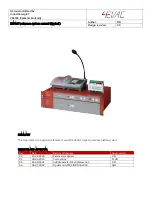
Introduction: Jog and Shuttle Operations Using the Search Dial
35
In
tr
odu
c
tio
n
Jog and Shuttle Operations Using the Search Dial
The search dial is used to search and check video.
Each press of the dial alternates it between SHTL mode and
JOG mode.
When the power is turned on, the search dial will not operate
unless it is first returned to the STILL position.
1
Press the search dial so that it remains pressed in.
The jog mode is now engaged.
2
Turn the search dial.
The dial’s click stops are released and playback is
performed at the speed the dial (–1 to +1×) is turned.
When the dial stops turning, the video becomes a still
picture.
3
To go to another mode from the jog mode, press the
button of the desired mode.
◆
NOTE:
• The direct search mode that allows you to go directly to the
shuttle mode or jog mode by turning the search dial is a factory
default.
• You can select [KEY] in setup menu No. 100 (SEARCH ENA) so
that the unit will not engage the search mode unless you press
the STILL/PAUSE button.
1
Press the search dial to release it.
This engages the shuttle mode.
When the power has just been turned on, turn the search
dial to its center position.
2
Press the STILL/PAUSE button.
3
Turn the search dial.
The playback picture speed changes from 0 to ±32×
depending on dial position.
Use setup menu No. 101 (SHTL MAX) to set maximum
speed to ±8, ±16, ±32, ±60 or ±100×. The dial has a click-
stop at the center for viewing still pictures.
4
To go to another mode from the shuttle mode, press
the STOP
button or other button.
◆
NOTE:
• The playback audio is audible at speeds in the range –10 to
+10× from the audio monitor output.
• The playback audio in the search mode contains noise.
• Playing back a clip that spans a multiple of P2 cards at speeds
faster than ±1× may break up the sound in the transition to
another card; this is normal and not indicative of a malfunction.
• Playing back a clip at speeds faster than –10× may break up the
sound; this is normal and not indicative of a malfunction.
Jog Mode
Shuttle Mode (SHTL Mode)
















































